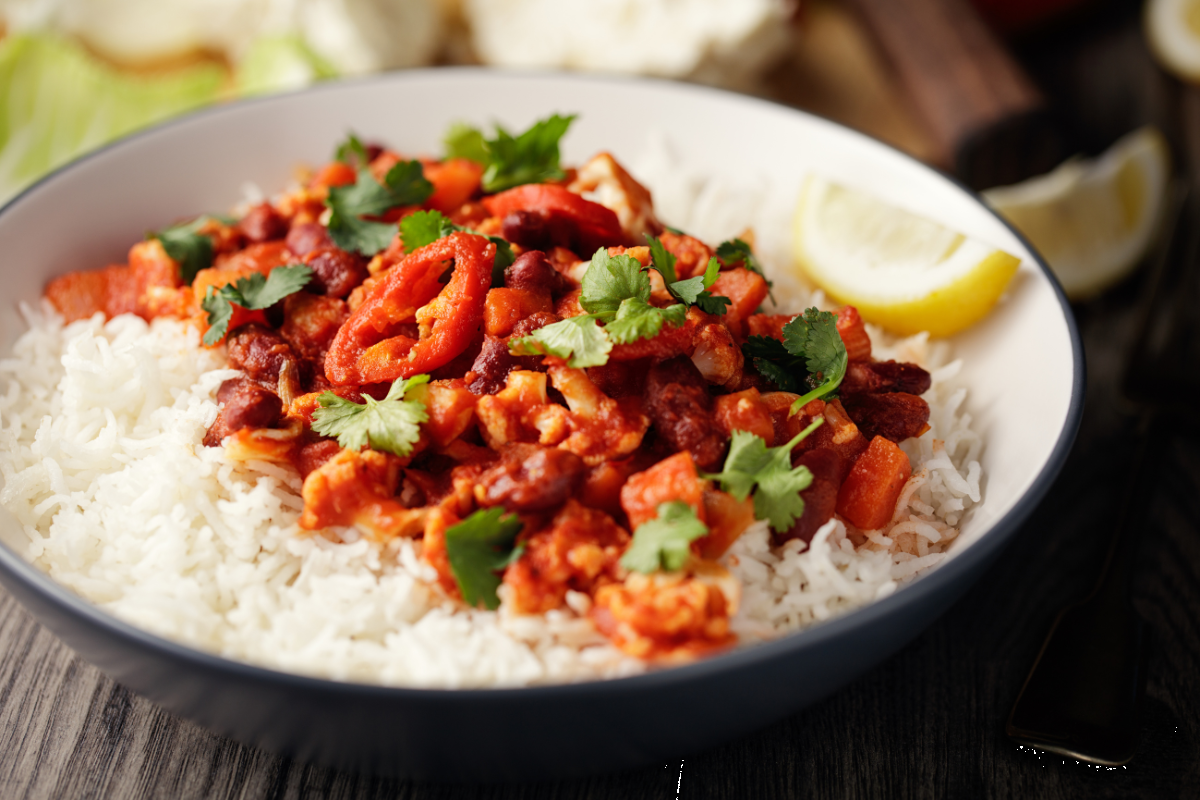It’s Veganuary! Are you looking to go vegan, or just want to eat more plant-based meals? At FareShare Midlands, we regularly redistribute lots of plant-based food, so here is some advice on how to use these tasty alternatives.
Veganism involves avoiding eating any products that derive from animals, such as cow’s milk, cheese, fish, eggs and meat. People may choose a vegan lifestyle for many reasons. This could be for animal welfare concerns, health requirements or environmental reasons.
Although a plant-based diet may initially seem restrictive, there are loads of delicious ways to utilise vegetables, pulses, fruits, grains, and dairy and meat alternatives to create filling, nutritious and tasty meals. As veganism grows in the UK, food suppliers offer an ever-growing range of plant-based products, from mince to cheese, sausages to yoghurts, steaks to milk – there is a vegan option for almost everything!
Vegan Milk and Cheese
A good substitute for dairy is any plant-based milk. Popular plant-based milks include almond, soya, coconut, and oat. They all have different qualities, for example oat milk contains antioxidants, and cholesterol-lowing properties, while soya milk is the only milk alternative that contains the same amount of protein as cow’s milk!
Vegan cheese is derived from vegetable proteins and is usually made from soy, nuts, and vegetable oils. Compared to dairy cheese, it is lower in fat and can reduce risk of diabetes and heart disease, however, it is also lower in protein and calcium. It may not be a vegan super food but is great for comfort cooking!
Vegan Sausages and Burgers
There are a huge range of vegan alternatives to dinner-time staples on the market, including sausages, burgers, steaks, and fillets.
These alternatives are some of the simplest ways to make a plant-based swap, as you pair them with everything you would normally put with their meaty counterparts!
For example, top your vegan burger with lettuce, fried onions, gherkins and ketchup to build the perfect plant-based stack, enjoy fish-free fillets with chips and mushy peas, or go for the classic bangers and mash:
Vegan Mince
Much like sausages and burgers, there are loads of meat-free mince options on the market, from brands such as Quorn, Meatless Farm, Beyond, This Isn’t and Richmond. Simply exchange for the beef mince in your spaghetti bolognese, tacos, lasagne or chilli recipes and then add all the spices and sauces that you would normally to have a super easy veggie dinner!
Good Old-Fashioned Veggies!
If meat-free alternatives aren’t your cup of tea, you can keep it old school and go for meals packed full of beans, vegetables and pulses! There are loads of vegan-friendly foods that are great sources of essential nutrients that you need to keep healthy.
As well as providing vitamins, fibre and antioxidants, you can also get nutrients that are typically found in animal-based products from a vegan diet.
Sources of calcium: green, leafy vegetables, soya, pea and oat drinks, calcium-set tofu, sesame seeds, pulses, brown and white bread, dried fruit.
Sources of vitamin D: fortified fat spreads, cereals and soya drinks.
Sources of iron: pulses, wholemeal bread, fortified breakfast cereals, buts, dried fruits and green, leafy vegetables.
Sources of B12: fortified breakfast cereals, soya drinks and nutritional yeast.
Sources of protein: tofu, lentils, beans, nutritional yeast, green peas, soy milk, oats, nuts and protein-rich fruits and vegetables
Leading a Healthy Vegan Lifestyle
Like any diet, veganism can be done healthily and unhealthily. Some plant-based foods, such as vegan ready meals or vegan alternatives, can contain a lot of salt or fat, so it is important to check the label and ensure to only eat in moderation foods which are highly processed.
Here are some tips for staying healthy on a vegan diet:
- Eat at least 5 portions of a variety of fruit and vegetables every day.
- Make sure you include or base meals on starchy carbohydrates and choose wholegrain where possible.
- Choose plant-based Milks and Yoghurts which are lower in fat and sugar.
- Eat plenty of beans, pulses, and other proteins to ensure you intake plenty of protein.
- Eat nuts and seeds rich in omega-3 fatty acids (such as walnuts) every day.
- Choose unsaturated oils and spreads and eat in small amounts.
- Drink plenty of fluids which are low in sugar (6 to 8 glasses a day).
- If including foods which are high in fat, salt, or sugar, have them less often and in small amounts.
For more healthy and nutritious recipes, please sign up to our mailing list: http://eepurl.com/g__SzD











